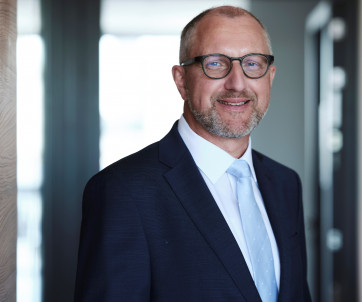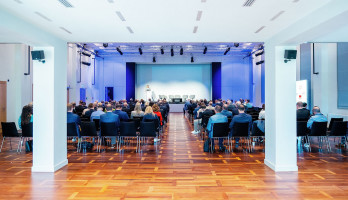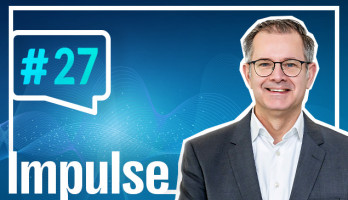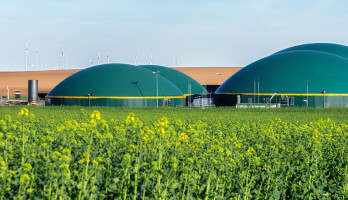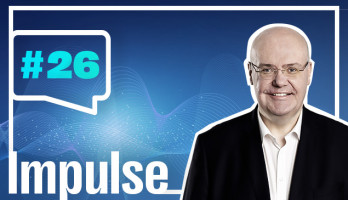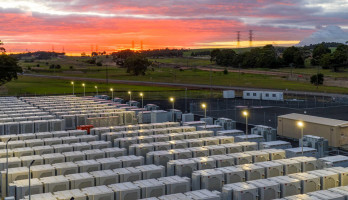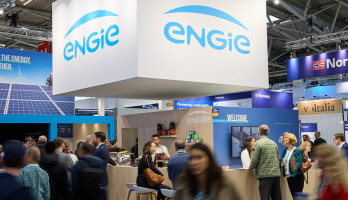
Ecological sustainability in the construction and real estate industry: An interview with Andreas Thamm
Making a contribution to a more sustainable construction and real estate industry of tomorrow: This is the mission of the Smart Building Innovation Foundation (SBIF), which was founded in Berlin on January 20, 2022. Representatives of the real estate sector, industry, technology and science have found a platform here for scientifically supported application innovations. As a founding partner of the Smart Building Innovation Foundation, we spoke with Andreas Thamm, Chairman of the Management Board of UBM Development Deutschland GmbH. He gave us insights into how the foundation came into being, his motivation, initial projects and his vision for the coming years.
Mr. Thamm, you were instrumental in establishing the foundation. What was your motivation?
Andreas Thamm: "There were various motivations. One motivation is to identify applications that really add value for the user. That sounds very simple - but it's not. Let me give you an example: I worked for a very innovative Dutch company in the past. There, with companies like Oracle and Scout, we had exactly the kind of tenants we wanted to have. One of the innovations was to develop an app for office buildings, which cost us a lot of money. We enthusiastically showed them our app, which can do so much, and the reaction was staggering: "No one from the outside can get into our IT environment," "We don't need that, and if we did, our programmers could develop that perfectly tailored to us." Suddenly I realized that the idea was great, but at the same time completely missed the demand.
That's the gap the Smart Building Innovation Foundation aims to fill. Technology topics are very complex, especially in connection with data use, which is why competencies need to be brought together and bundled. We want to create added value, and to this end we have joined representatives from the real estate sector, industry, technology and science to jointly identify topics and subject areas. This should result in data-based insights and applications that will also be made publicly available."
Why did you choose the organizational form of a foundation?
Andreas Thamm: "With the support of Roland Berger Strategy Consulting, we examined various organizational forms. A foundation was the most interesting option for us. It ensures legal security through a foundation law, and there is a regulating authority. In this form of organization, it doesn't matter whether you are a small company or a global corporation - you can operate on an equal footing!
In addition, we have chosen the form of a non-profit limited term trust in order to work on socially relevant issues at different levels, which in our case deal with sustainability and assistive technology. The limited term trust has to contribute all the funds made available to it for the purpose of the foundation. We also want to share our knowledge and support the entire industry in making real estate more future-oriented and sustainable. For this reason, we have made a commitment through the nonprofit status to also publish our findings."
How does the cooperation work in concrete terms?
Andreas Thamm: "Imagine a pyramid. At the top are topic areas, so-called use cases. These are identified together with all the founders. The respective topic area is then subdivided into individual topics and finally individual building blocks. Here, work is done in working groups. Towards the bottom, the work becomes very small-scale. Why? So that we can stop things quickly if, for example, we discover that something doesn't work, the technology isn't ready yet, or the topic won't be relevant for five years after all. We can react flexibly because we can quickly see whether something is working or not.
And since this is not a commercial set-up, we are also allowed to come to the conclusion: It doesn't make sense! That's a win-win for everyone, because it's a finding that helps further and a finding that we would then publish as well."
What are your first projects and research tasks about? Can you reveal something about that?
Andreas Thamm: "One overarching theme that will keep coming up is data collection and use. We also have a huge block of energy issues. Understandably, even more important now than it once was. One working group is looking at how to automate work so that not as many workers are needed for facility management services. This is related, among other things, to the challenge of finding personnel in the field. We did not discuss this first major topic, but specified it as a founding member. It is a topic whose added value is clear and which will help us learn how to work together. By the fall of 2022, I'm sure we'll be ready to identify new topic areas together."
You've been in the real estate industry for so long, what do you see as the key developments in terms of smart building?
Andreas Thamm: "The ESG criteria (ESG: Environmental Social, Governance) in conjunction with the EU taxonomy lead to buildings being classified. The constant tightening of the criteria can turn a class A++ building into a class E or G building within a very short time. I see the challenge as creating something that continually optimizes these buildings and further reduces the CO2 footprint throughout the life cycle. As we optimize the function of large-scale technical systems through software solutions, among other things, we will write algorithms, develop them further, and hopefully soon be able to give software updates to investors. The aim is to use software solutions to improve already existing buildings and to achieve and maintain a good classification. A side effect: loss of value can be avoided without having to rebuild the building or invest in new plant technology. That's my vision, which I'm pursuing and which is certainly feasible."
ESG - from our point of view, this is a topic that is currently very much on the minds of the real estate industry. Do you see it that way, too?
Andreas Thamm: "Absolutely, and that's a good thing. This creates pressure points that really get the industry moving. The real estate industry existed in a stable environment for decades and now there's a lot of movement and change coming."
The real estate industry has traditionally been a very long-term investment economy. Do you think regulatory pressure will shorten investment cycles?
Andreas Thamm: "Yes, definitely. Especially for refurbishments of real estate! Software solutions based on the Tesla principle would be an alternative. Once you have bought the car, you will receive software updates that can be imported centrally. I imagine something similar for real estate."
This holistic view of the whole building is very well reflected in the Smart Building Innovation Foundation, also with the partners you have brought on board. Are there comparable initiatives?
Andreas Thamm: "There are many foundations and initiatives that deal with a wide variety of topics in this area. However, against the background of quickly identifying topics and trying out approaches to solutions, there is nothing comparable in Germany. This speed and agility were the main motivation for most of the founders. We would like to pilot the first solution approaches as early as the end of 2022!"
Our Expert
